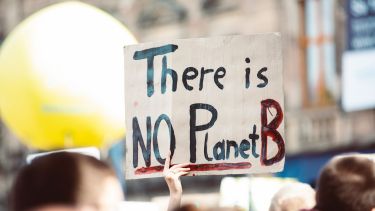Influencer Marketing and Climate Change
Influencers can play an important role in stimulating prosocial behaviours. However, sponsors are still hesitant to employ influencer marketing as a communications tool, as best practices remain to be explored, and its outcomes are often unclear.

There are growing concerns around the impacts of global challenges such as natural or humanitarian crises, technological disruptions, or social movements. These challenges often cause uncertainty and require the support of the public to implement effective response strategies. A lack of communication and engagement with key stakeholders could have serious implications—especially during acute and unprecedented crises. Influencers can play an important role in stimulating prosocial behaviours. For example, the UK government successfully applied influencer marketing to promote their Test and Trace program. However, sponsors are still hesitant to employ influencer marketing as a communications tool, as best practices remain to be explored, and its outcomes are often unclear. Influencer marketing may also cause backlash and may be received with scepticism if sponsors are not careful enough in their influencer choice.
White Rose funds a project entitled ‘Unleashing The Power of Influencer Marketing to Stimulate Prosocial Causes’ to fill above research gaps by extending the current knowledge on conditions where influencer marketing can be most effective in promoting prosocial behaviour to address the climate change emergency. Using an interdisciplinary approach, this project, which is funded by White Rose, brings together a team of Social Science, Engineering, and Environmental Management researchers from leading universities of Sheffield, Leeds, and York to decode complexity of influencer. The key objectives of this project include:
- To provide a space to critically discuss the role of influencer marketing in tackling societal and ecological challenges (climate change)
- To critically explore the opportunities and risks of employing UK influencers with the aim of driving behavioural changes, and informing key beneficiaries such as government, NGOs, marketing practitioners
- To advance the current knowledge of influencer marketing by empirical assessment of role and type of influencers (i.e., warm vs. competent and real vs virtual influencers) and sponsor type (i.e., NGO vs. government) in triggering prosocial behaviours
- To measure and compare the engagement of the people of Britain in response to the prosocial campaigns in the UK context.
- To build research capacity by involving early career researchers (ECRs) on co-developing research outputs and co-delivering the expected outcomes
Staff
Principal investigator
Co-Is Sheffield University Management School
Co-Is University of Leeds Business School
- Maximilian Gerrath, Lecturer in Marketing
- Josko Brakus, Professor of Marketing
Co-Is University of York
- Hamed Ahmadi, Lecturer in Intelligent Communications, Department of Electronic Engineering, Communication and Technologies Group
- Nadina Luca, Lecturer in Marketing








